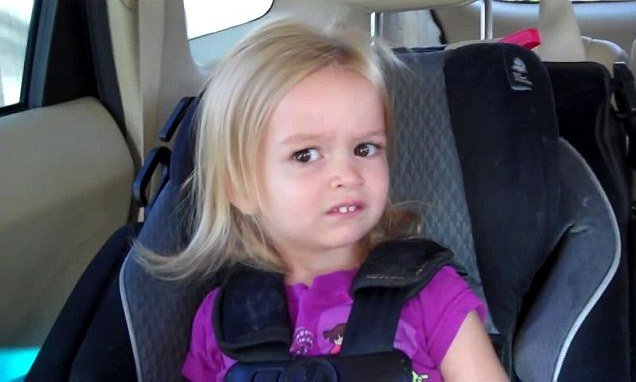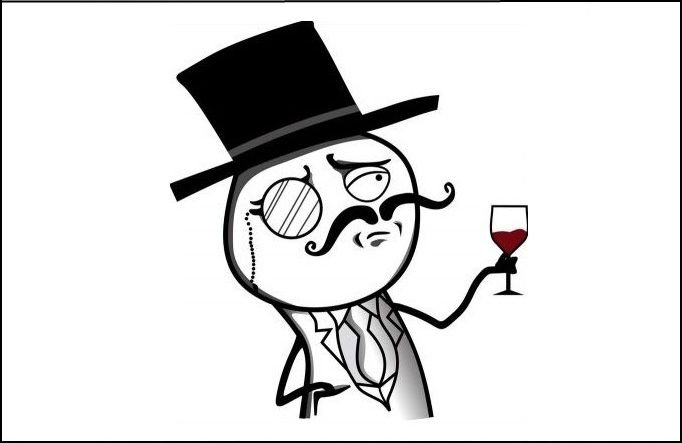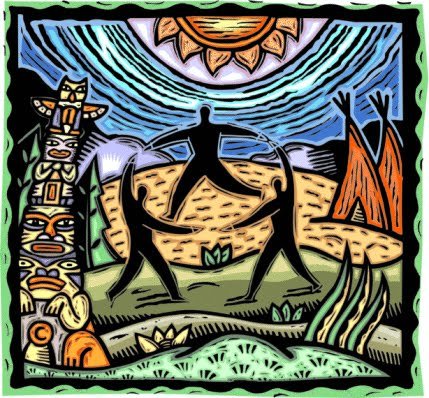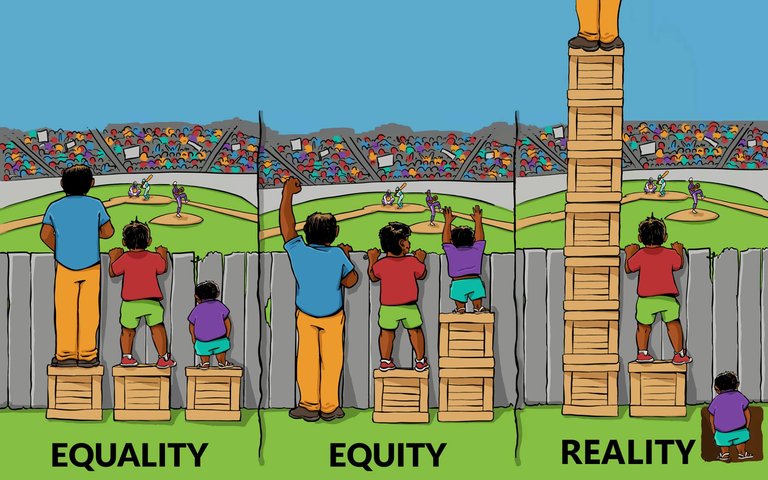Fairness Matters
There was a recently trending post that expressed disdain for the concept of fairness. The author dismissively referred to it as "all in our head," in an attempt to delegitimize claims that negative voting systems could result in unfair outcomes. He expressed his opinion that people's perceptions of unfairness were based on a sense of entitlement fueled by envy.

I agree completely that the idea of fairness is all in our head. It is just that; an idea, a concept. When we refer to something as fair or unfair, we are describing a subjective experience. We describe how we perceive the conditions that we observe. Some of his examples illustrate an additional characteristic of fairness: it is not something that applies to natural phenomena or human beings in isolation. Fairness can only exist within a social context, and attempts to apply it elsewhere quickly break down.
However, I disagree with the author's attempts to delegitimize the idea of fairness. People experience unfairness as painful and distressing on many levels. It is worth striving for fairness on that basis alone. But even considering little more than pragmatism, people expressing such experiences are providing meaningful information that can inform the decision making of those who are in a position to influence the future direction of the platform.
The Emergence of Fairness
A New Yorker Article from earlier this year rounded up some of the latest research into the perception of fairness and how it is expressed through our behavior.
One famous and illustrative experiment on capuchin monkeys demonstrated what psychologists refer to as "disadvantageous-inequity aversion." In the study, monkeys were given tokens and presented with the opportunity to trade the tokens for food. Monkeys who received cucumbers for their tokens responded angrily when other monkeys received grapes.

It should come as no surprise that monkeys (or people) have a negative reaction to getting less than others for the same activities. Based on nothing other than self-interest, it is a frustrating situation to be in. However, that doesn't tell the whole story.
Humans sometimes also demonstrate an aversion to having more than others. Psychologists call that advantageous-inequity aversion. While disadvantageous-inequity aversion is nearly universal and a response that we share with other animals, advantageous-inequity aversion appears to be a conditioned response that develops at a later point in childhood. It also occurs in some societies at higher rates than others, which is an indication that it is culturally influenced.
Fairness Is Technology
The author goes on to describe additional studies and theories. The research itself is fascinating and it's worthwhile to read the piece in its entirety. I would just like to point out a statement towards the end of the article that is incredibly insightful and relevant:
Our ideas about fairness are relativistic, rather than absolute. In many ways, we approach fairness as a form of social signalling. People tend not to care about equality as an abstract principle; instead, they use fairness to negotiate their place in a social hierarchy.
When looking at fairness from this perspective, it reveals itself to be a very sophisticated invention. Or perhaps a better way of looking at it would be as an innovation. It's a novel application of an otherwise unremarkable psychological response that we share with many other animals.
The research suggests that the distress produced by the "disadvantageous-inequity" is based in the loss of status that the inequity represents. The consequences of losing status has far reaching consequences in the animal kingdom. The prospect of missing out on mating opportunities is one of the more devastating ones.
Humans are capable of much more dynamic relationships. Social status among groups of people is determined by many more factors than providing food and security. We play a much more sophisticated game. Elaborate strategies emerge as we demonstrate our value to the group.

Fairness Depends On Your Social Status
What constitutes fairness? A growing body of research indicates that we do not hold people of different social status to the same standards: What counts as fair for a high-status individual does not necessarily count as fair for a low-status individual.
A sensitivity to the unfairness that others experience and a willingness to sacrifice on their behalf demonstrates enormous value. Social groups that rely on cooperation and mutual aid will reward such individuals with increased standing in society.

Lower Status Individuals Are More Accepting of Disadvantageous Income Inequality
We find that participants with lower status are less dissatisfied with disadvantageous payoff inequalities than equal or higher status participants. (http://www2.ne.su.se/paper/wp12_10.pdf)
It is a mischaracterization to accuse people speaking out against unfairness as entitlement and envy. Particularly so if those people are of a lower status than the beneficiaries of the inequality. If lower status individuals are discontent with the levels of inequality, it is an indication of truly perverse inequity.

It should be interpreted as a signal that the social or economic system is deeply flawed and prone to failure. The long term viability of such a system is at risk.
Unfairness Is Information
When social groups based on free association are deemed unfair, people will inevitably leave. When people express that they experience unfairness and they are ridiculed for it, it erodes trust in a very meaningful way.
The author seems to accept the idea of fairness by the end of his post. Not as an idea that has merit, but as a simple fact that he is going to have to deal with.
That said, perception often matters more than reality and we must design systems that are perceived to be fair even if they are logically and “objectively” less fair from the perspective of mathematics, deductive reasoning, and first principles.
I am hopeful that the author will continue moving in this direction and work to enhance the perceived fairness of the platform. In this case perception is reality.
"While disadvantageous-inequity aversion is nearly universal and a response that we share with other animals, advantageous-inequity aversion appears to be a conditioned response that develops at a later point in childhood"
Yes, this is the development from the formation of our ego-personality-identity construct, self-view, image of self, sense of self, shifting from a more self-concerned, self-focused, self-centered and self-considered perspective on one side of the spectrum/polarity, to progressively include the external world, and others, into our worlview and how we behave. It is a move from self without much concern for others, towards a cooperative, social, reciprocal causal-effect understanding of self & others together.
As you say, unfair systems of inequity will be recognized and people's actions will reciprocate a causal balance in the long-term to correct such systems. This is a corrective responsibility that each person is required to make, and as a whole to represent the way of living we all choose to accept as our way of life in a society. Once the exploitative measures are recognized and people choose to do something about it, then the socio-ecnomic survivability for those who have chosen the unfair route, will begin to crumble.
Good post. I also talk about morality and consciousness in my own work. Peace.
Great post..... "unfairness is information"
Thank you bacchist. You nailed it! Down with the Ancaps!
Ancaps aren't necessarily against addressing the issue of fairness. I for one have also written about the unnecessary imbalance of steemit's reward system, and prefer the arguments made here to the ones that throw the word 'complainer' at everyone.
Nice to hear, zorrotmm. I must admit that my impression of ancaps is pretty bad,and I often think that they seem completely blind to wealth inequality,and to the fact that money is an instrument of power which is IMO more important than the state(which I also want to remove).
But I´m seriously happy that I´m agreeing with an Ancap about something. After all I favour cooperation and collaboration over conflict,when possible.
I always like your posts and the way you write.
Being not an English native speaker, I wish I could write like you :)
I had mixed feelings while reading Dan's post as well. On one hand, I agreed with much of what he said, but on the other....so much is still just unfair, isn't it? I don't always feel a lack of fairness from envy or entitlement for myself (although that is the case sometimes), but when I see a hastily put together recipe blog on this site with a couple pictures that gets 200 times more than a well written, beautifully documented and formatted, and better looking recipe/dish, I feel one person is not being treated fairly.
I agree with everything you wrote whole heartedly, and happily followed you.
Awesome post !
Gracias por compartir este material.
I like the discussion about the importance of status and the role it plays in our relationships and interactions. Money is (or is supposed to be, prior to FED manipulation), a ledger system for keeping track of who provided value to others. Using it as a marker for status within a group makes a lot of sense, if it accurately reflects value provided to others in the group.
I wonder, is that because they feel they deserve a lower status (rightly or wrongly)? Does a poverty mindset have anything to do with this finding?
You lose me a bit here. Describing what is doesn't necessarily indicate a failed system. It also doesn't indicate a solution either, it's just what is. Although many like to combine the two directly, you can have social systems separate from economic systems, though they are obviously closely related.
For example: Voluntaryism as an economic system (mutually beneficial free trade, personal and private property rights, etc), allows for the social system of communism in terms of a group of workers coming together to own their means of production, redistributing their own earned value among their own community based on needs, etc. Communism, as I understand it, does not allow for the economic system of Voluntaryism and its understanding of property rights.
I was very close to including research that draws a distinction between status and power. As you point out, status can be understood as a function of the value provided to the group.

(I hope that came out alright... doing this from my phone)
Interesting. I think this may highlight a difference of opinion many AnCaps and AnComs have regarding the roll of money in society. AnComs may see it as a tool of powerful people to oppress others (which, as with any tool used by people intent on evil, is certainly true). AnCaps, on the other hand, see it as a non-coercive result of peaceful, voluntary, mutually beneficial trade, something which increases someone's status.
Maybe both are right and both are wrong in that the real problem is people intent on doing harm to others or, at the least, not looking out for those who can't help themselves.
Yeah, I think that's a good way of putting it.
I'd love to see your thoughts on this post by @xtester: https://steemit.com/steemit/@xtester/an-open-letter-to-the-community-in-defense-of-inequality
I think this can all be well related to objective views vs subjective and the individual vs society (which I call propriety after reading Smith's TOMS (almost reading). Fairness might not be definable in some forms but society does seem to collectively levate it's own version. It might not be ultimate or ideal but it is a helpful construct or marker if one wants to succeed in this world. Aligning one's views with the social norm, can be helpful for some reasons.
I still don't see how one can get a clear, vaguely objective definition of fairness. And without it, it can be easily manipulated as a concept. And you can end up with someone calling unfairness any situation one happens not to like.
It's not really possible to have an objective definition of fairness. Fortunately, frivolous claims of unfairness lose credibility.
hello @bacchist, great post! I like it and I have featured your meme in this post https://steemit.com/meme/@delphia16/daily-pick-of-hidden-memes-1 . Hope that's fine
It is not my work, though... Found it on the internet.
Idea of fairness is subjective if it is derived from socially constructed morality.
Fairness is not subjective anymore if it is derived from science. Science has discovered a lot in the subjects of human behavior and social engineering.
It can tell us what behaviors are fair (sustainable) and why.
Steemit in the state it is now is probably one of the worst examples of unfair social projects, I have discovered so far. Hopefully it will change in the future by changing how it works.
I'm sorry that I can't upvote this post since it was made shortly before the payout time and the system won't let me. I have to say that I agree. There is vast inequality, and clearly fairness is a matter of equity. There are changes that need to be made for sure. But also I'm hoping that by the whales powering down things will start to level out... Payouts need to be flattened as well. Unfortunately I don't see that happening any time soon.
You can still upvote for no reward but it's ok no need to upvote, actually. Thanks for offer anyway.
The reason I posted this reply is not to get a buck but express a point of view.
Thank you for your reply. I'm glad that we agree on that :-)
Oh and one more thing. It is obvious that such whale as dantheman would not admit that Steemit is unfair, but instead criticize those who try to point it out. Self evidently, the unfairness here does not affect him.
The picture of crying baby as alluding to those who criticize the inequality, only exposes his attitute...
Can you explain to me how they didn't "earn" it? Do you mean they didn't "earn" it through starting with 0 and posting / curating to earn it? Or do you mean they mined earlier than others?
To me, they more than earned it because they built it or were really early adopters willing to take risk to mine and promote something brand new. Without their efforts, none of us would be here. That to me, is earning quite a bit.
If, in the future, hundreds of thousands of people are working hard to get noticed so they can get $0.05 here or there on a post once in a while, will they claim you didn't earn your position of 655 Steem Power because you were here earlier than them?
That's empirically false. View the blokchain data if you disagree.
is in contradiction with
which you said originally. That's the point I was trying to make. Does Steemit have an economics problem? It's very possibly it does, and I've been very vocal about that already in posts like this.
I assume by "childish" you mean irrational? To me, if they did indeed "earn it" (as you're now saying they did and that's no problem), then how is that "unfair"? If I create something, do I have the right to destroy it by making bad decisions (if that's indeed what's happening here)?
You're creepy, rapey and clearly have some issues with females..Go blow a goat @feminism / @earnest you sexist ballsac.
It's ok if your mom didn't love you or whatever.. But taking it out on the women in our steemit community will only end up in people casting hatred and despair onto you.
flagged for blatant verbal abuse with no substantive content
EDIT: flag removed after you edited your comment. It's still hostile and rude, but at least it has some substance now and isn't pure verbal abuse. In neither case am I stating an opinion on whether it was deserved.
@smooth I'm publically appealing this flagging.
Flagging me for attacking a stalker and someone that glorifies the rape of females and is a known alt of asshat @earnest is a wee bit much don't you think?
Makes me wonder what your stance is on the abuse of women on steemit.
That user is full of nothing but hatred towards women. Sometimes you have to fight hatred with hatred. I'm not going to create an anonymous alt account to call out losers like this.
I'm asking you unflag me not because I'm personally asking you to, But because we honestly need to make a stand against these pieces of shit that harass women and glorify violence and rape against them.
Some choose to write long winded articles, I chose to call a piece of shit a piece of shit.
If that isn't allowed here and it's agreed that we must be friendly to people who do nothing but spread malcontent and fear out of fear of flagging this whole platform will fail.
Your flag is more abusive than my comment is, straight up. Infact one could easily view you flagging my comment as siding with @feminism AKA @earnest and supporting hatred against women.
edit: I apologize for offending @smooth with my language. Thank you for removing the flag. However I maintain my stance that user @feminism / @earnest is a cancer on steemit and shouldn't be regarded with any respect what so ever.
You're a wanker bud. Make amends with your mom and stop hating women. -_-